I believe communities are essential for businesses.
When I heard Mark Zuckerberg say, “Groups are at the heart of the experience” at the 2019 F8 conference, I wondered, “What's Mark's real objective here?”
Today, I'd like to explore whether marketers, creators, or businesses should entrust their communities to Facebook.
But first, a story.
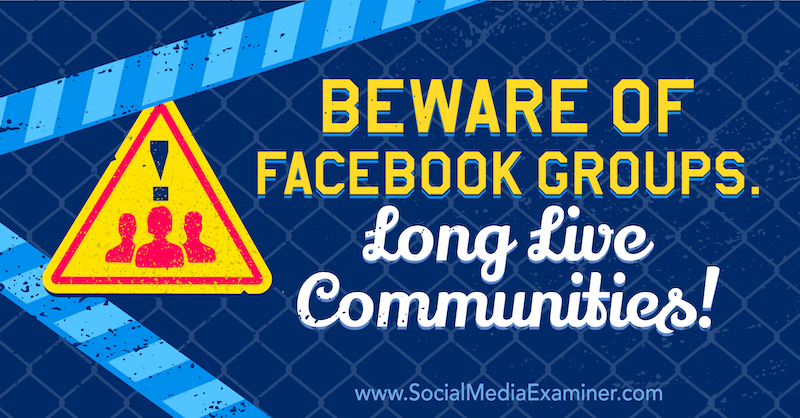
Back in the Day… Facebook Was for Us All
In the early days, there were transformational opportunities for nearly any business that was involved with Facebook.
By 2009, businesses were coming off of a major market crash.
They were desperately seeking economical alternatives to promote their products and services.
In those days, any business could rapidly grow a Facebook following and fans would see what the page posted.
Comments were plentiful. People were REALLY engaged. And it was all free.
Businesses Help Facebook Grow
By 2011, businesses were heavily promoting Facebook—from printing the Facebook logo on their products to mentioning the platform in their ads.
For instance, in 2011, brands like Pepsi, Budweiser, and Sketchers all ended their Super Bowl ads with a reference to Facebook.
Here's one from Brisk starring Eminem:
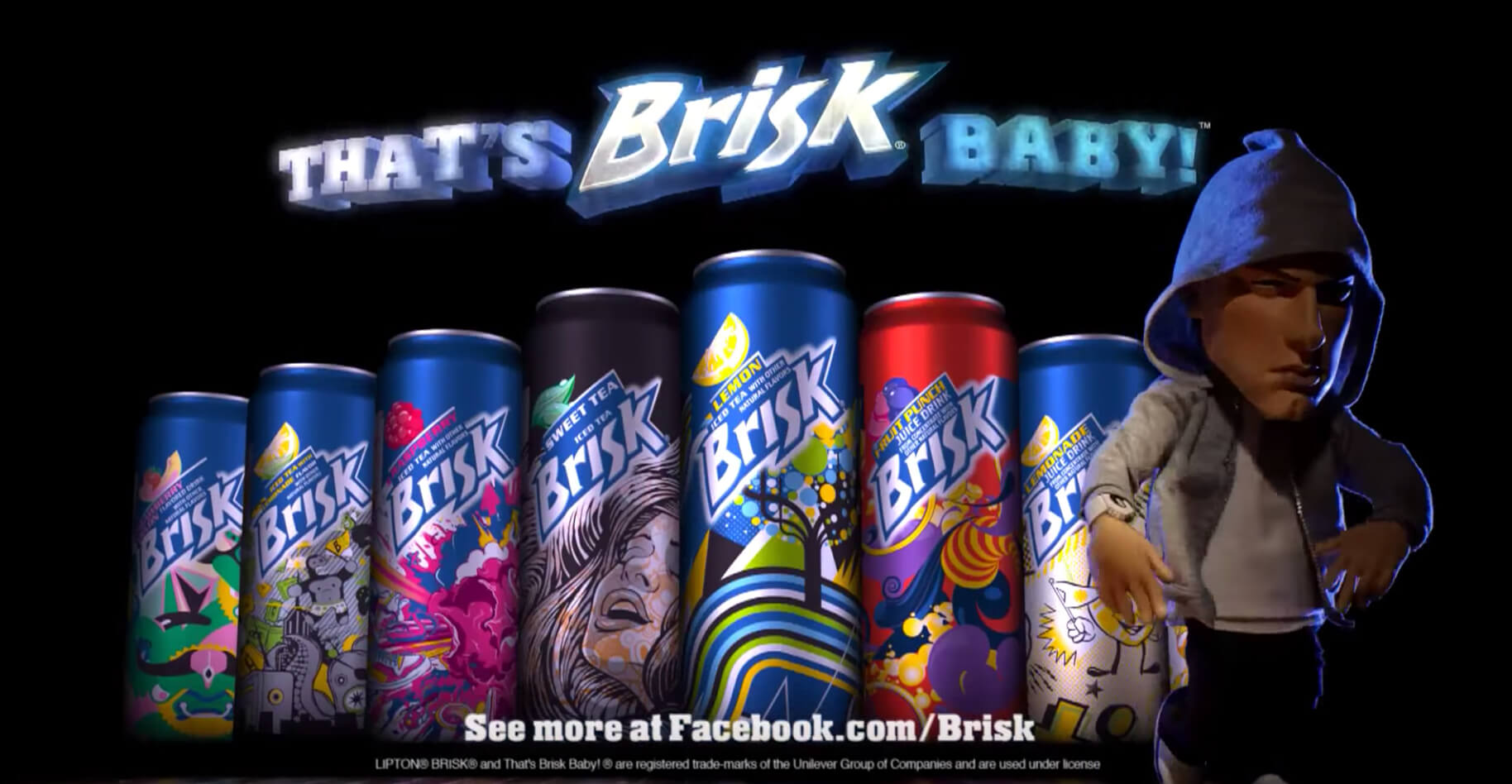
Imagine paying $1 million to Eminem and another $3 million to Fox for the Super Bowl ad placement.
Get World-Class Marketing Training — All Year Long!
Are you facing doubt, uncertainty, or overwhelm? The Social Media Marketing Society can help.
Each month, you’ll receive training from trusted marketing experts, covering everything from AI to organic social marketing. When you join, you’ll also get immediate access to:
- A library of 100+ marketing trainings
- A community of like-minded marketers
- Monthly online community meetups
- Relevant news and trends updates
And the main call to action was… you guessed it—to visit their Facebook page.
That seems crazy today. Back then, it was what marketers did—point everyone to Facebook.
Everyone, everywhere, was promoting Facebook. And it was good.
Today, the Lipton Facebook page has more than 7.5 million fans, yet their average post gets about 100 likes, a tiny fragment of the audience they've developed.
If we could peek into their Facebook Insights, we'd likely be shocked at how small their reach really is, given the size of their fan base.
Your Facebook Page: A Deserted Metropolis
This is an important part of the story.
In mid 2012, Facebook signaled that organic reach had been scaled back and that something bigger was to come when they introduced promoted posts, a way for pages to boost their reach.
About 9 months later, Zuckerberg said, “The News Feed is one of the most important things we've built. How we're all sharing is changing and the News Feed needs to evolve with those changes.”
Facebook made a major change to its news feed, introducing bigger images and offering more control to users.
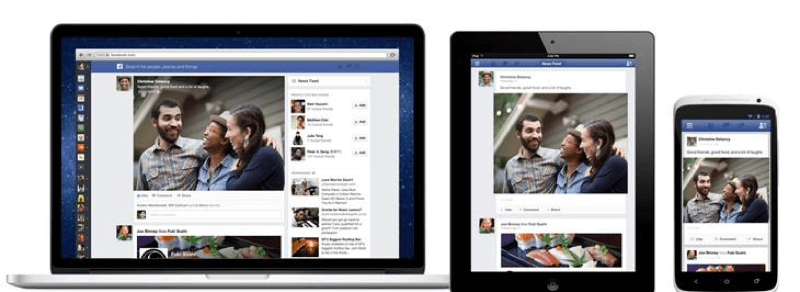
Hidden beneath those graphical updates and Zuckerberg's words was a different kind of change—an expected evolution. The change would be forced on pages.
By the end of 2013, Facebook page reach plummeted by as much as 44%.
“Facebook irked many marketers and page admins in that announcement by saying that they can make up the difference in reach by advertising or boosting posts,” explained AdWeek.
It's as if Zuckerberg said, “Pay us and we'll give you back what you've built.”
Marketers Divided By Algorithm Changes
As the news feed changes started sinking in, a great divide began in the social media marketing industry.
Two camps of marketers emerged.
In one camp, the pragmatic marketer said, “We're allowed to exist freely on this platform, so just smile and suck it up.”
Their argument was that Facebook had done so much for business and we should embrace change and roll with the times. Essentially, Zuckerberg is our benevolent king and we don't want to lose his trust.
In the other camp, the skeptical marketer said, “Facebook is an investment that previously yielded results and is now no longer a sure thing.”
To this camp, it was marketers who had helped quickly accelerate the success and fame of the platform, and now they were losing their free benefits.
Businesses were beginning to question if they could trust Facebook with their future.
Marketers who've been around for a while know the rest of the story.
Facebook continued to reduce post reach. Today, it's a tiny blip of what it once was.
For example, for Social Media Examiner, a good post will reach about 20,000 of our 545,000 page fans (about 3.7%).
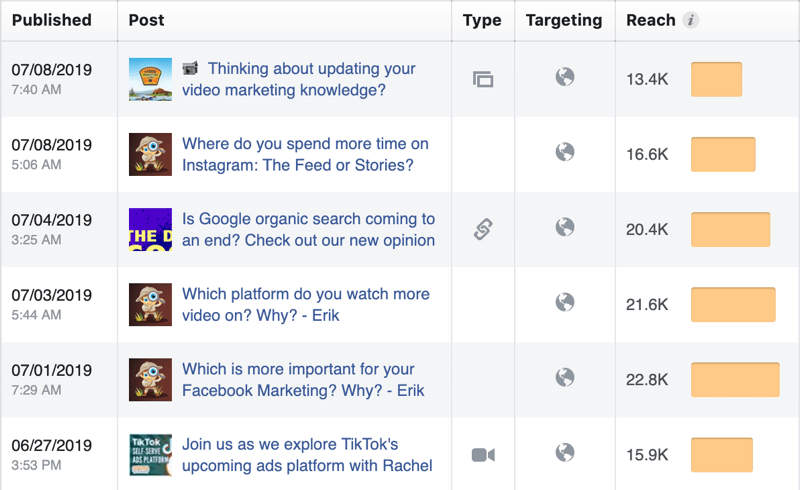
We've added about 20,000 fans in the last year without any real effort. Are those 20,000 people part of the group that sees our posts? We have no idea.
One thing we know for sure is this: Most of our fans will NEVER see any of our posts (unless we're willing to pay for reach).
Nowadays, brands no longer mention Facebook in their ads. The Facebook logo has been scrubbed from the labels of most products.
Marketers were instrumental in helping Facebook become well-known. We played our part at Social Media Examiner by publishing hundreds of Facebook-centric articles over the last 10 years.
Today, Facebook pages have turned out to be an investment that no longer yields much organic fruit.
Should we have seen it coming?
Were we temporarily blinded by the promise of attention?
Could this cautionary tale repeat itself?
Facebook Groups Declared as the Future
Back to Zuckerberg's 2019 F8 speech. He said, “We've redesigned Facebook to make communities as central as friends.”
There are 400 million people active in Facebook groups, he explained.
So if that many people are active in groups, why the push for more people to be more active in groups?
Let's explore some possibilities:
#1: People are leaving Facebook.
At least in America, people are leaving Facebook.

Discover Proven Marketing Strategies and Tips
Want to go even deeper with your marketing? Check out the Social Media Marketing Podcast! Publishing weekly since 2012, the Social Media Marketing Podcast helps you navigate the constantly changing marketing jungle, with expert interviews from marketing pros.
But don’t let the name fool you. This show is about a lot more than just social media marketing. With over 600 episodes and millions of downloads each year, this show has been a trusted source for marketers for well over a decade.
The crew over at Edison Research (the same people who do election exit polls) recently found that 15 million fewer Americans were using Facebook than a few years ago.
And the biggest drop is among 12- to 34-year-olds—the next generation.
A 2018 study by Pew Research showed that only 51% of teens ages 13–17 are using Facebook, down from 71% in 2017.
During F8, Zuckerberg coupled Facebook and Instagram when he spoke about the company. Perhaps because Instagram is the company's only platform with growth opportunities.
#2: Data is getting harder for Facebook to collect.
Facebook is going to begin encrypting private communications, and Zuckerberg acknowledges that this will further reduce their targeting ability.
In an interview with Wired magazine, Zuckerberg said, “It is true that if we have access to less information, then that makes a lot of our ranking in filtering systems, it makes them somewhat less effective. That's something that we're going to have to deal with across everything that we want to do, so not just on ads.”
Facebook also announced it plans to make it easier for consumers to clear their offsite data collection.
Additionally, popular web browsers like Firefox and Safari are also making it easier to block the Facebook pixel.
#3: Groups allow Facebook to collect hyper-targeted data.
If people have rich conversations inside of Facebook groups, this becomes fertile ground for Facebook to mine data.
“The more people who come together to talk about their interests—whether they're political, financial or religious—the more data Facebook can collect. There's nothing more delicious for Facebook than having people come into groups and talk,” said privacy expert Adam Levin to MarketWatch.
#4: Facebook NEEDS us to create and nurture groups.
If Facebook can make groups very robust for businesses, this could become a new way for businesses to evangelize Facebook.
Facebook rolled out a LOT of new features for Groups in 2019, including connecting a group to a page.
If it's true that (1) fewer people are using Facebook, (2) that data will be harder to collect, and (3) that groups provide the perfect place for the company to collect better targeting data for advertisers, then…
Facebook really needs groups for its long-term success.
This might explain why Facebook recently launched its first major ad campaign.
And guess what the main focus of those ads are? You guessed it, Groups!
Check out this ad from Facebook:
I think the signals are clear: Facebook needs tens of thousands of people to create and nurture groups. It needs hundreds of millions of people to activate inside of groups.
Marketer: Beware of Facebook Groups
If Facebook cares so much about groups, why did it abandon the Facebook Group app in late 2017?
Back in 2014 when the Groups app was spun off, “Groups already had 700 million monthly active users, it was the next logical target for ‘unbundling,'” declared this Mashable article.
However, today, you must open the Facebook app and navigate to Groups.
My guess is that most people likely see group posts ONLY as they scroll the news feed.
That means your groups posts compete directly with ads and personal updates.
We need to ask ourselves a few very important questions:
Q1: Should we evangelize Facebook groups to our customers, prospects, and fans?
It's true that Facebook groups are becoming very robust and powerful for admins. A Facebook group is perhaps the best community development option for marketers today and groups are freely built on top of Facebook's robust platform.
But if we as marketers begin pointing our customers and prospects over to Facebook groups, is this any different than including Facebook in a TV commercial?
Are we putting a stamp of approval on the platform and becoming unwitting evangelists for Facebook?
Is it a smart business decision to build up a tribe on a platform that people are leaving?
Is it wise to build our tribe on rented ground?
Q2: Will Facebook do to groups what it did to Facebook pages?
Think about your Facebook page. Now look into the future and ask yourself, “Will this also happen to Facebook groups?”
We recently conducted a poll on Facebook shown below:
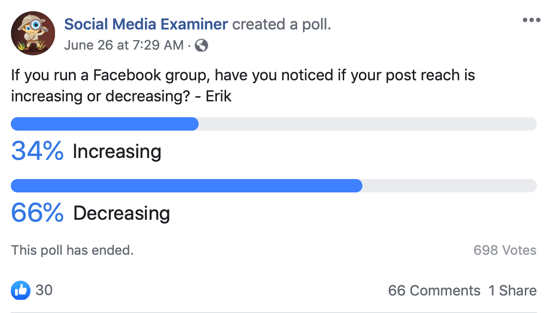
Two-thirds of nearly 700 Facebook group admins said their group post reach is declining. Perhaps the change has already started.
“In the not-so-distant future, group admins will not just be doing the hard work of keeping your groups active, you will have to pay Facebook for the privilege of running your group in ways that we can't even imagine today,” predicts Gina Bianchini, founder of Mighty Networks.
Q3: What are the alternatives to Facebook groups?
If you're concerned about Facebook groups, what other options do you have?
Outside of Facebook, the only other major social platform that offers groups is LinkedIn. And frankly, those groups are a pale shadow of what they once were.
Another option is to build your own solution using good old-fashioned forums. WordPress offers BBPress and there are many third-party options.
You could also explore special platforms like Slack or Mighty Networks.
We at Social Media Examiner are seriously exploring our options.
So what will you do with your community?
What do you think?
Are you concerned about building your community on Facebook? Do you think Facebook will pull a “bait and switch” and eventually charge groups to get reach to their communities?
What do you plan to change, if anything? Am I overreacting? Let's talk. Leave a comment below.
Attention Agency Owners, Brand Marketers, and Consultants

Introducing the Marketing Agency Show–our newest podcast designed to explore the struggles of agency marketers.
Join show host and agency owner, Brooke Sellas, as she interviews agency marketers and digs deep into their biggest challenges. Explore topics like navigating rough economic times, leveraging AI, service diversification, client acquisition, and much more.
Just pull up your favorite podcast app, search for Marketing Agency Show and start listening. Or click the button below for more information.

